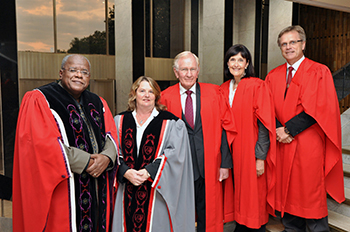Latest News Archive
Please select Category, Year, and then Month to display items
22 May 2020
|
Story Nitha Ramnath
![]()
A Virtual celebration of Africa Month
On 25 May 2020, Africa will celebrate the 57th anniversary of the founding of the Organisation of African Unity. A central tenet of the organisation, which was the predecessor of the African Union, is African solidarity. Member states undertook to coordinate and intensify their cooperation and efforts to achieve a better life for the people of Africa. The University of the Free State (UFS) has a long tradition of commemorating Africa Day and the ideas underpinning it. Every year, diverse events aimed at advancing African unity and solidarity take place during Africa Month – traditionally, the highlight is the Africa Day Memorial Lecture hosted by the University's Centre for Gender and Africa Studies.
This year, celebrating African unity through significant events involving the physical presence of a large number of people, will likely be impossible. COVID-19 is ravaging the world and Africa may become one of the world regions worst affected by the consequences of the virus. Social distancing may be difficult to achieve in a continent with densely populated urban centres that often feature large informal settlements. Besides, the economies of African nations are not as robust as those of other world regions. The challenge that Africa is facing, appears to be one that can only be mastered by its people acting in solidarity and unity. The continent has already developed an Africa Joint Continental Strategy for COVID-19 Outbreak to combat the virus, and an Africa Taskforce for Coronavirus has been established. The ideas of African togetherness and the underpinning philosophy of Ubuntu may be critical for strengthening African solidarity at a time when it may be more relevant than ever.
The commemoration of Africa Day takes a different theme each year. This year, the UFS 2020 Africa Month celebrations will take a virtual format, with the theme of ‘Africa together forever’ underpinned by the COVID-19 global pandemic. The theme is particularly significant considering the context of the African continent; and only through the demonstration of solidarity and unity can Africa overcome the challenges of the global pandemic.
The University will host a variety of cultural and intellectual contributions on the dedicated UFS virtual Africa Month website. On Africa Day (25 May 2020), a virtual Africa Day function, which will be posted on the website, will conclude the Africa Month commemorations.
The diverse contributions to the 2020 virtual Africa Month activities will highlight the University’s commitment towards creating a diverse, challenging intellectual environment. The UFS strives as a research-led university, to provide an environment in which new ideas are incubated and debated; contributing towards its transformation process and African unity.
Wrongful suffering must be compensated, Prof Johann Neethling argues
2016-04-20

From the left are Prof Jonathan Jansen, Vice-Chancellor and Rector, Prof Caroline Nicholson, Dean of the Faculty of Law, Prof Neethling, Prof Rita-Marie Jansen, Vice-Dean, and Dr Brand Claassen, Head of the Department of Private Law.
Photos: Stephen Collett
|
On 11 April, the Faculty of Law held the first of the year’s series of Prestige Lectures presented by Prof Johann Neethling, Senior Professor in the Department of Private Law. The event was attended by senior faculty members, the Dean of Law Prof, Caroline Nicholson, and the Vice-Chancellor and Rector, Prof Jonathan Jansen.
In his opening remarks, Prof Jansen said “Prestige lectures are at the heart of a university’s academic endeavour. It would serve the university community well to present them more often, as they go to the heart of important issues that affect society”
Prof Neethling made a compelling case for compensation for wrongful suffering by a child born with impairments. Since the mid-1960s, the actions of wrongful conception and wrongful birth have been recognised in South African law. Wrongful conception is defined as when a healthy child is born as a result of failed sterilisation or abortion, and wrongful birth is when a doctor fails to inform parents of a disability before the birth of their child.
“The reality is that a child born with impairments may indeed suffer (sometimes extreme) pain, loss of amenities of life, which would justify an award of damages,” he said.
So far, the action for wrongful suffering has been dismissed by the High Court and the Supreme Court of Appeal. However, he highlighted several cases where wrongful conception and wrongful birth was recognised by the courts.
“Why can the same approach (for wrongful conception and wrongful birth) not be followed in wrongful suffering claims by accepting that a disabled child seeks to address the consequences of its birth?” he asked.
Prof Neethling is regarded as one of the greatest minds in Private Law, not only in South Africa but in the African continent.
A festschrift, Essays in Honour of Johann Neethling (2015), with contributions from more than 50 of his peers around the world, was also launched at the lecture.